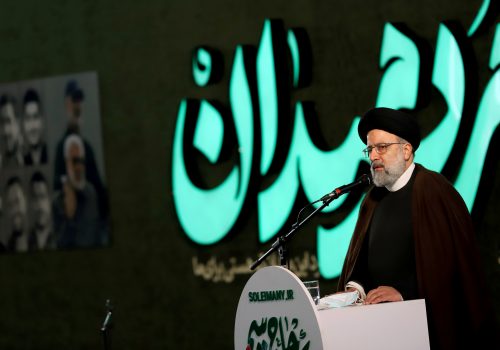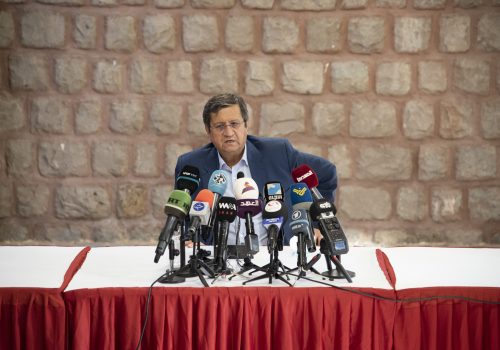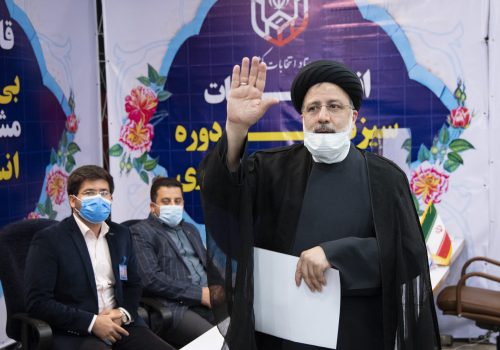The JCPOA but not much else: Modest expectations for US-Iran relations post Rouhani
If most predictions are accurate, Iran will elect hardline Judiciary Chief Ebrahim Raisi as its next president on June 18, replacing the relatively moderate, Western-educated Hassan Rouhani. For the United States and Iran, which have had largely adversarial relations for the last forty-two years, a Raisi presidency could portend not much beyond a return to a 2015 nuclear agreement that traded limited sanctions relief for time-bound curbs on Iran’s nuclear activities.
A resumption of the Joint Comprehensive Plan of Action (JCPOA), under discussion now for several months in Vienna, would not be insignificant. However, US hopes for a “longer and stronger” agreement with Iran are likely to be dashed given the views of Iran’s Supreme Leader, Ayatollah Ali Khamenei, and the inertia in the Iranian and American political systems.
Khamenei’s views count most in Iran, but the president and cabinet also play a role. Some have suggested that a hardline consolidation of power in Iran would facilitate better ties with the US since “reformists” would not get credit. But Raisi’s background and those of the men he is expected to put into positions of authority weigh against anything more than a brittle détente. Few, if any, will likely have Western academic degrees—unlike the Rouhani team—or much other familiarity with the West. For most, the eight-year bloody Iran-Iraq War, in which the US sided with Iraq, was a formative and negative experience. To the extent these men seek closer foreign ties, they look toward Russia and China for strategic cooperation and trade and investment—allies who won’t interfere in Iran’s internal affairs. (Plus, with China’s rise, Iran no longer needs the US as much as it once did.)
Since the 1979 revolution, Iran and the US have typically been out of sync. When Iran reached out to the US for a better relationship—as it did after the 1991 Gulf War and again after the September 11, 2001 attacks—the US was not amenable. When the US tried to improve ties, Iran often seemed incapable of responding or its security forces took actions that sabotaged progress. The only concrete improvements came in the second terms of two US Democratic presidents—Bill Clinton and Barack Obama—and in the first terms of reformist Mohammad Khatami and Rouhani. Otherwise, the history has been one of “getting to no”: a depressing chronicle of missed opportunities, mutual insults, and wasted overtures.
The JCPOA represented a paradigm shift. It grew out of European talks with Iran that began in 2003—when the George W. Bush administration, having developed hubris after toppling governments in Afghanistan and Iraq, refused to sit with Iran unless it scrapped its controversial nuclear program. But the negotiations did not make real progress until Iranians and Americans met alone—first in back-channel talks in Oman in 2012 and 2013 and later in New York, Geneva, and Vienna. Only after Rouhani’s first election in 2013 did the process really begin to bear fruit, in part, because of relationships built between then US Secretary of State John Kerry and Iranian Foreign Minister Mohammad Javad Zarif and between US Energy Secretary Ernie Moniz and fellow MIT graduate, Ali Salehi, the director of Iran’s Atomic Energy Organization.
The value of these ties was made clear after a US Navy boat strayed into Iranian waters in January 2016 and Kerry and Zarif were able to get the crew freed within twenty-for hours.
However, implementation of the JCPOA was not perfect. In early 2016, The US Congress passed—by veto-proof majorities—legislation that required Europeans and others who had traveled to Iran to get visas to go to the US. This negatively affected Iran’s ability to attract Western investors. At the same time, Iran held onto a dual national, Siamak Namazi, while freeing other detainees in a parallel process to implementing the JCPOA (Namazi and several other dual nationals remain in custody until today).
The default position of Iran’s Supreme Leader has always been one of hostility toward the US, but Khamenei had indicated that the JCPOA might not be a one-off. If it was successfully implemented, it could be, as Zarif put it, “the foundation, not the ceiling” of Iran’s foreign relations, including with Washington.
Any such potential vanished with the 2016 election of Donald Trump, who had campaigned vociferously against the JCPOA. He quit the deal—despite Iranian compliance—in 2018. His then Secretary of State, Mike Pompeo, put forward a list of “twelve demands” for Iran to unconditionally accept, launching a process of “maximum pressure” that not only failed to bring Iran back to the negotiating table, but incentivized it to ramp up both its nuclear activities and its support for anti-Western militants in the Middle East. The January 2020 US assassination of Iranian Quds Force leader Qasem Soleimani in Iraq was another blow to any possible reconciliation under the Trump administration.
With Joe Biden’s win came the prospect of rolling back at least some of these negative developments. During his campaign, Biden promised to salvage the JCPOA and named an experienced envoy, Robert Malley. But the time for progress before Iranian elections was short and Rouhani’s team—led in Vienna by a deputy foreign minister—didn’t even have permission to sit in the same room with the Americans. As the presidential elections drew closer, Khamenei was so determined to avoid a Rouhani-like successor that his handpicked Guardian Council, a vetting body, disqualified even the former speaker of parliament, Ali Larijani, a regime loyalist who had defended the JCPOA (one of the presidential candidates, former Iranian Central Bank chief Abdolnasser Hemmati, got into hot water for suggesting he might meet with Biden if elected).
At this juncture, Iran remains committed to domestic and foreign policies that are viewed as abhorrent by many Americans. Biden, who sees China as the biggest threat to US international leadership, wants to cool tensions with Tehran and draw down the US military presence in the region. But having experienced years of estrangement with Iran as an active American politician, Biden is probably too realistic—and too cynical—to chase the unicorn of US-Iran ties even if he found a receptive audience in Tehran.
Meanwhile, the generation of Iranians like Zarif—who got his PhD at the University of Denver’s Korbel school, named for former Secretary of State Madeleine Albright’s father—is fading from the scene. Replacing this cohort are the “young and pious” men of the Islamic Revolutionary Guards Corps and their clerical friends.
For now, it appears, the US Embassy in Tehran wusill remain a tourist attraction for “revolutionary” youth and the Iranian Embassy in Washington will stay a boarded-up relic on Massachusetts Avenue.
Barbara Slavin is director of the Future of Iran Initiative at the Atlantic Council. Follow her on Twitter: @BarbaraSlavin1.
Image: Banners of presidential candidate Ebrahim Raisi are seen during an election rally in Tehran, Iran June 14, 2021. Majid Asgaripour/WANA (West Asia News Agency) via REUTERS


